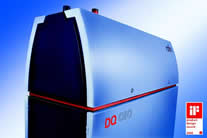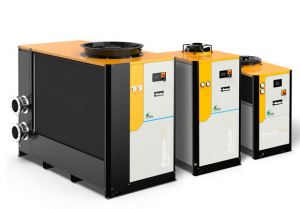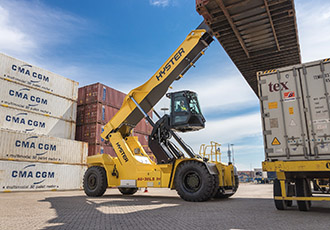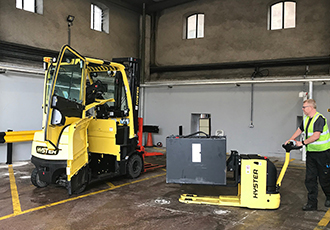New Peak Power for Rofin Q-Switched Solid State Lasers
28th April 2009
Source:
Rofin-Baasel UK Limited

Rofin has broadened its successful high power DQ series of q-switched solid state lasers with introduction of the new DQ 010. The high performance lasers of the DQ series have already proven to be excellent tools for surface applications such as ablation, cleaning and insulation with other applications currently in development. The 1 kW output power and increased pulse peak performance of the DQ010, which are 1,000 times higher than CW powers, reduce cycle times and ultimately operating expenses.
Reduced investment and running costs
Rofin DQ lasers are firmly established across a wide industrial application area. The DQ010, with its 1,000 Watt average power, can be integrated with beam switches or power splitter modules allowing the use of one beam source in several different production lines. This means that initial investment cost are reduced, whilst the increased efficiency of the beam source lowers the ongoing running costs. The high average power makes it an efficient tool for selective material removal. It is ideal for solar panel ablation, mould cleaning, material coating removal, and surface treatment of flat screens. The DQ010 is the most efficient q-switched laser in its pulse range, and with the DQ series offering power ranges of 500 Watt, 800 Watt and now 1kW from the DQ010, Rofin is now able to further broaden the range of applications for their q-switched lasers.
Ablation of aluminium-silicone coatings
The ablation of the aluminum-silicon coatings from manganese boron tailored blanks is a typical application where Rofin DQ series lasers offer a fast, eco-friendly and cost effective alternative to traditional sand-blasting or chemical etching processes. Compared with conventional steels, the tensile strength of these steels, especially following heat treatment is much greater, leading to reduced material thickness without any reduction of the strength of the finished part. The automotive industry has been using these positive features to reduce weight, which in turn reduces fuel consumption, and also improve crash protection. The aluminium-silicon coating however had prevented these materials from being used for tailored blanks. The aluminium-silicon coating applied to these steels is required as a zinc coating would vaporise at the temperatures, in excess of 900oC, required for processes such as hot stamping on these materials. This would leave the material susceptible to scaling and corrosion. The aluminium-silicon coating however does have its own disadvantages as it will combine with the base material during laser welding and therefore has to be removed prior to welding.
Rofin DQ series q-switched lasers can remove the aluminium-silicon coating from manganese boron steels at impressive rates. The lasers can be coupled with fibre optics of 600 or 800 μm square. Compared to round fibres, square fibres provide highest efficiency by machining a larger area for each pulse. Combined with an integrated scanner, ablation rates up to 100 cm2/s are achievable across a diverse range of applications. Every DQ lasers is equipped with an optical attenuator for constant pulse energy and long-term stability control. This key feature optimizes application processes by ensuring that the pulse energy remains constant.
Rofin DQ lasers are firmly established across a wide industrial application area. The DQ010, with its 1,000 Watt average power, can be integrated with beam switches or power splitter modules allowing the use of one beam source in several different production lines. This means that initial investment cost are reduced, whilst the increased efficiency of the beam source lowers the ongoing running costs. The high average power makes it an efficient tool for selective material removal. It is ideal for solar panel ablation, mould cleaning, material coating removal, and surface treatment of flat screens. The DQ010 is the most efficient q-switched laser in its pulse range, and with the DQ series offering power ranges of 500 Watt, 800 Watt and now 1kW from the DQ010, Rofin is now able to further broaden the range of applications for their q-switched lasers.
Ablation of aluminium-silicone coatings
The ablation of the aluminum-silicon coatings from manganese boron tailored blanks is a typical application where Rofin DQ series lasers offer a fast, eco-friendly and cost effective alternative to traditional sand-blasting or chemical etching processes. Compared with conventional steels, the tensile strength of these steels, especially following heat treatment is much greater, leading to reduced material thickness without any reduction of the strength of the finished part. The automotive industry has been using these positive features to reduce weight, which in turn reduces fuel consumption, and also improve crash protection. The aluminium-silicon coating however had prevented these materials from being used for tailored blanks. The aluminium-silicon coating applied to these steels is required as a zinc coating would vaporise at the temperatures, in excess of 900oC, required for processes such as hot stamping on these materials. This would leave the material susceptible to scaling and corrosion. The aluminium-silicon coating however does have its own disadvantages as it will combine with the base material during laser welding and therefore has to be removed prior to welding.
Rofin DQ series q-switched lasers can remove the aluminium-silicon coating from manganese boron steels at impressive rates. The lasers can be coupled with fibre optics of 600 or 800 μm square. Compared to round fibres, square fibres provide highest efficiency by machining a larger area for each pulse. Combined with an integrated scanner, ablation rates up to 100 cm2/s are achievable across a diverse range of applications. Every DQ lasers is equipped with an optical attenuator for constant pulse energy and long-term stability control. This key feature optimizes application processes by ensuring that the pulse energy remains constant.
Similar articles
More from Rofin-Baasel UK Limited
- Rofin's Vision for Perfect perforations 8th August 2011
- ROFIN’s PowerLine L Series Designed for High-Speed Micro Material Processing 11th June 2010
- ROFIN’s Marathon Marking Session 18th May 2010
- Rofin-Baasel Receives Intel’s Preferred Quality Supplier Award For The Third Consecutive Year 19th March 2010




.jpg)







Write a comment
No comments